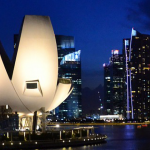For many people, the word “luxury” conjures up ideas of lavish hotels, yachts, and fast cars, just out of reach. Yet for others, luxury means business opportunities.
More and more people are jumping into the luxury sector, trying to land jobs with top fashion houses, jewelry designers, and luxury auto companies. According to Anthéa Davis, the director of corporate relations at ESSEC Business School, about 20 percent of students who pursue the school's MBA in International Luxury Brand Management generally come from banking or finance roles.
“They have been doing it for several years,” says Davis of these students, “and are looking for a way to use their expertise to move into a position in luxury.”
Indeed, traditionally-lucrative fields like finance are losing more people to the luxury sector simply because the latter is more resistant to global economic shifts.
Marika Taishoff, MBA director at the International University of Monaco, says that “the luxury buyer tends to be relatively immune to economic crises, so there might be a blip in the stock market, but luxury buyers will still want to buy the same quality goods that they're used to.”
And with increased demand, driven by emerging economies like China and a reluctant embrace of e-commerce, the luxury industry needs people with solid business skills and an interest in all things haute.
“The industry is looking for people that can work in finance, in supply chain,” says Luana Carcano, lecturer at the Milan-based SDA Bocconi, “and also understand the business.”
To prepare people for the unique demands of the luxury industry, a number of MBA programs offer specialized curriculum and concentrations in luxury management. NYU Stern, for example, offers an MBA concentration in “Luxury and Retail;” Alma Graduate School at the University of Bologna has a concentration in “Design, Fashion, and Luxury Goods;” and MBA students at HEC Paris can pursue a certificate in “Luxury Strategy.”
Programs like these can provide business insight into a field that has unique challenges. In the International University of Monaco's Luxury MBA specialization, the curriculum includes courses in “Luxury Consumer Behavior,” which leverages insights from research in human behavior; and “e-Luxury,” which exposes students to the new sales and marketing technologies that are gaining traction in the industry.
Likewise, in ESSEC's International Luxury Brand Management MBA, the curriculum includes classes on counterfeiting as well as other topics specific to the luxury industry. “We talk a lot about anthropology,” says Simon Nyeck, the program's academic director, “because as the end of the day, luxury is just, to me, culture.”
Beyond specialized curriculum, many MBA programs that focus on the luxury business include hands-on components, so that students can get practical experience in the industry. Students pursuing SDA Bocconi's track in “Luxury Business Management,” for example, spend part of the program in Rome at the headquarters of Bulgari, a jeweler and luxury goods retailer. There, they take luxury-specific courses, and can see the workings of a luxury business in action. Students also do a field project, either in Bulgari or another luxury company.
Luxury-focused MBA students at ESSEC also do project in a luxury company that suits their individual interests. Students have done these projects with a wide range of luxury companies, from Louis Vuitton and Chanel to Bicardi and Estée Lauder.
“It could be developing business in a new country, opening a new store, launching a new perfume, developing a brand,” says Simon Nyeck.
Location, location, location
Many business schools that offer specialized programs in luxury leverage their location in order to provide students with networking opportunities in the industry. Monaco, for example, “is a luxury laboratory,” according to Marika Taishoff, because of the city-state's concentration of wealth and the presence of many top luxury brands.
“To come here and study luxury makes perfect sense,” Taishoff says, “because you're not just studying it, you're living it, even if it's only vicariously.”
Likewise, students in the SDA Bocconi MBA program have close access to many Italian luxury businesses like Versace and Armani.
“One of the advantages of being in Milan and in Rome is that you are here, you can meet the companies, you can meet managers,” says Luana Carcano. And this can be especially important for international students:
“The luxury business is by its nature a Europe-based world,” Carcano says. “You can meet people here, and then go back home and put to use your experiences and expertise.”
Marika Taishoff says that the International University of Monaco's MBA program tends to draw from a wide range of nationalities, and that many of the international students try to work in Europe for a year or two after graduation to increase their credibility in the luxury industry.
“It adds value to their expertise and know-how to train up here first,” she says, “and then they can go back to their home countries where they are needed.”
Indeed, with demand rising in developing countries, there is an increasing need for people trained in the luxury field. According to ESSEC's Anthéa Davis, “what we've been noticing in the last two years is that there's a huge lack of talent in Hong Kong and in Dubai.”
Accordingly, ESSEC has been taking students on field trips to these locations to attend company presentations from luxury businesses.
“As a result of this,” Davis says, “quite a few students, even American students, have found employment in Hong Kong and Dubai.”
Through these international experiences and an exposure to the wide diversity that MBA programs in luxury tend to draw, students start thinking beyond the traditional ways into the luxury business.
According to Marika Taishoff, during the Monaco MBA program, “students starting thinking outside the normal routes of going into Madison Avenue, or going into Sixth Avenue, or finding a job on Rodeo Drive – and they really think about the other spots for growth and opportunity.”
Photo: Ed Callow / Flickr










